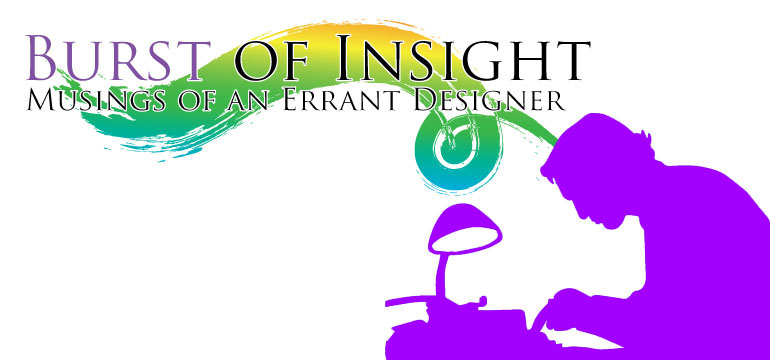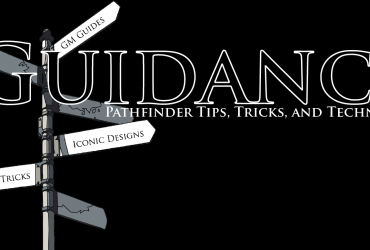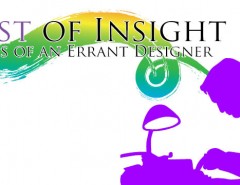Pathfinder, like D&D before it, is a direct decedent of Tolkien-esque fantasy. Humans, elves, hobbits (or halflings) travelling together on adventures. An argument could even be made that with books like the Advanced Race Guide we’re perhaps closer to Narnia type fantasy with even more fantastic races and creatures rubbing shoulders with hardly a second glance. But that isn’t the only sort of popular fantasy fiction GMs and players might wish to emulate. From David Eddings to George R.R. Martin or any myriad others, there are plenty of sources of inspiration for a human centric campaign.
And while the existing rules for humans allow for plenty of variation, they can seem bland and generic when compared to the unique sorts of abilities that dwarves, elves, and gnomes get. So why don’t we do something about that?
Now the immediate and obvious choice is to create rules for the ethnicities of your fantasy world and while this may be tempting I’d like to avoid it at all costs. Codified rules for things like that creates certain assumptions and stereotypes that can be dismissive and harmful to your players (or readers).
That isn’t to say that some stereotyping isn’t useful: If you say for example that your PC was the blacksmith’s apprentice that tells us something about her physical physique or if we’re talking about your friend’s PC and say he’s “genial” that tells us something about his temperament. Both of these examples allow us to begin defining humans as something more interesting than an ability boost, bonus feat, and a few extra skill points. Let’s call these Character and Origin Traits and we’ll say each character gets one of each.
From a mechanical standpoint each of these traits should then be roughly half the worth of the current racial options, fortunately the Advanced Race Guide breaks this down for us. Using the race builder rules most of the standard races run about 10 Race Points with the biggest outliers being dwarves at 11 RP and half-orcs with only 8.
So as long as our character traits work out to being between 3 and 5 RP we should be in the right ball park.
We need to establish a couple of rules upfront though to prevent creating compatibility issues between the two traits particularly regarding ability scores. The Ability Score Modifier Quality should only be applied to one side type of trait if ability score modifiers need to be applied to the other kind of trait use the Ability Score Racial Traits. For our purposes today Character Traits will take the former and Origin Traits the latter.
Additionally, all or most should be humanoid and size medium. Although if you want a Child or Short character trait you could adjust the size to small. A Short option would easily support players who want to make their own version of Tyrion Lannister. It may also be worth noting that some of these trait combinations may also yield results with too many special abilities in a particular category. To keep this to a minimum try to limit the number of racial abilities in a single category, if you go over here and there it shouldn’t matter too much but be careful.
Sample Origin Traits
Smith’s Apprentice (5 RP)
You were trained as a blacksmith’s apprentice working long hours in the heat of the forge.
Forge Magic: Your understanding of fire and molten metal grants you a +2 bonus on caster level checks to overcome spell resistance when casting spells with the fire descriptor. (1 RP – This is a variant of the 3 RP Elven Magic. With the Spellcraft element removed and the ability further restricted by limiting it to fire spells 1 or two points seemed reasonable. I opted to calculate it as 1 RP due also in part because many PCs who take this Background will not be spellcasters.)
Strong: You gain a +2 racial bonus to Strength (4 RP) but your long hours of physical labor have taken their toll on your education you suffer a -2 penalty to Intelligence (-2 RP – I added ability penalties to this part of the build but you’ll notice I didn’t zero out the +2 Strength/-2 Intelligence. The reason is your players are pretty much guaranteed to min-max their builds. It’s okay for them to do so but you should account for that in the build which is why I only gave half credit back on the Intelligence penalty.)
Tempered Body: You have energy resistance (fire) 2 and receive a +2 racial Bonus on Constitution Checks and Fortitude saves to avoid fatigue and exhaustion as well as any other ill effects from running, forced marches, starvation, thirst or hot environments. (2 RP this is a slightly modified Desert Runner.)
Street Rat (4 RP)
You grew up fighting for scraps on the streets in a big city, living by your wits alone.
Plagueborne: You gain a +2 racial bonus on saving throws against disease, ingested poison, and becoming nauseated or sickened. (1 RP)
Scavenger: You gain a +2 racial bonus on Appraise and Perception Checks to find hidden objects (including traps and secret doors), determine whether food is spoiled, or identify a potion by taste. (2 RP)
Stalker: Perception and Stealth skills are always class skills for you (1 RP) if your personality trait also grants the stalker ability you also gain a +2 racial bonus to Stealth.
Scholar (5 RP)
You grew up in comfort and have had the opportunities to become highly educated.
Linguist: Your extensive study means you begin play with Common plus your national language (if any). Furthermore, if you have a high Intelligence score you can learn any language you want except for secret languages such as druidic. (1 RP)
Generalized Knowledge: Select two of the following skills: Heal, Knowledge (any), Linguistics, or Spellcraft you gain a +1 racial bonus on those skills. (1 RP)
Skilled: You gain an additional skill rank at 1st level and one additional skill rank whenever you gain a level. (4 RP)
Sheltered Upbringing: Your upbringing was largely without hardship as a result you suffer a -2 to your Constitution score (-2 RP – As above I’m not giving a full -4 credit.)
Specialized Knowledge: Select one skill from the generalized knowledge list that you did not select you gain a +2 racial bonus on this skill and it is always considered a class skill for you. (1 RP)
Sample Character Traits
Genial (5 RP)
You are a generally warm and pleasant person but not terribly imposing or threatening. Genial characters are typically good aligned.
You gain a +2 racial bonus to Charisma and Wisdom but suffer a -2 penalty to Strength (1 RP)
Cordial: You gain a +2 racial bonus to Bluff and Diplomacy but suffer a -2 penalty to Intimidate. (3 RP)
Sociable: When you attempt to change a creature’s attitude with Diplomacy but fail by 5 or more you can try to influence the creature again even if 24 hours have not passed (1 RP)
Tough
You are strong and hardy. Often unyielding both physically and socially. Tough characters can be of any alignment.
You gain a +2 racial bonus to Strength and Constitution but suffer a -2 penalty to Charisma. (1 RP)
Healthy: You gain a +4 racial bonus on Fortitude saves against disease and poison, including magical diseases (2 RP)
Stubborn: You gain a +2 racial bonus on Will saving throws to resist spells and spell-like abilities of the enchantment (charm) and enchantment (compulsion) subschools. In addition, if you fail such a save, you receive another save 1 round later to prematurely end the effect (assuming the spell or spell-like ability has a duration greater than 1 round. This second save is made at the same DC as the first. If you have another similar ability from another source (such as the rogue’s slippery mind class feature), you can only use one of these abilities per round, but you can try the other on the next round if the first ability fails.
This highly experimental set of rules draws on material within and without Pathfinder. While fiddling with the rules I kept a copy of White Wolf’s Laws of the Night close at hand to refer to the Nature and Demeanor rules and the character traits. I also credit Monte Cook Games Cypher system for inspiring aspects of this build as well. While the end result more resembles the Cypher System I’d like to at some point revisit this idea and sprinkle in a little bit more White Wolf and use that result to also phase out alignment from a future campaign, such as my Ravenstone concept we’ve been building here or a gritty politically charged game in the vein of Game of Thrones (George R.R. Martin) or the First Law world (Joe Abercrombie).
If you have any suggestions for additional Origin or Character Traits feel free to post them in the comments.







For my setting I swapped all cultural racial traits for physiological ones, and made culture a separate character statistic which set how many background skills you get, your starting languages, alters proficiency, and has a few Traits that you can pick from.